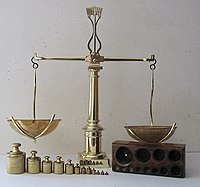
Photo from wikipedia
Abstract In assistive robotics applications, the human limb is attached intimately to the robotic exoskeleton. The coupled dynamics of the human-exoskeleton system are highly nonlinear and uncertain, and effectively appear… Click to show full abstract
Abstract In assistive robotics applications, the human limb is attached intimately to the robotic exoskeleton. The coupled dynamics of the human-exoskeleton system are highly nonlinear and uncertain, and effectively appear as uncertain load-torques at the joint actuators of the exoskeleton. This uncertainty makes the application of standard computed torque techniques quite challenging. Furthermore, the need for safe human interaction severely limits the gear ratio of the actuators. With small gear ratios, the uncertain joint load-torques cannot be ignored and need to be effectively compensated. A novel disturbance observer based dynamic load-torque compensator is hereby proposed and analysed for the current controlled DC-drive actuators of the exoskeleton, to effectively compensate the said uncertain load-torques at the joint level. The feedforward dynamic load-torque compensator is proposed based on the higher order dynamic model of the current controlled DC-drive. The dynamic load-torque compensator based current controlled DC-drive is then combined with a tailored feedback disturbance observer to further improve the compensation performance in the presence of drive parametric uncertainty. The proposed compensator structure is shown both theoretically and practically to give significantly improved performance w.r.t disturbance observer compensator alone and classical static load-torque compensator, for rated load-torque frequencies up to 1.6 Hz, which is a typical joint frequency bound for normal daily activities for elderly. It is also shown theoretically that the proposed compensator achieves the improved performance with comparable reference current requirement for the current controlled DC-drive.
Journal Title: Mechatronics
Year Published: 2018
Link to full text (if available)
Share on Social Media: Sign Up to like & get
recommendations!